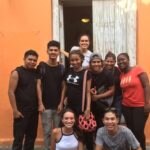International Youth Day: social enterprises abounding in education secure a future for young people
August 12 is International Youth Day, a day designated by the United Nations General Assembly to remember, among other facts, that 24 million young people do not got to school, and one in ten live in zones suffering from armed conflict. Education is the key to ensuring these generations have opportunities in the future.

As the UN laments, political instability, a challenging labor market, and limited opportunities to participate in civic and political affairs have isolated younger generations. With its annual celebration, the UN wants: “to promote the role of young people as essential partners in processes of change and to raise awareness of challenges and problems facing the world’s youth.” This year the theme focuses on inclusive, accessible education for young people – something that the businesses participating in the latest round of BBVA Momentum know a lot about. These enterprising initiatives can serve as examples to inspire the entrepreneurs of today or those of tomorrow.
Eight Million Stories (U.S.A.)
This social enterprise, based in Houston (Texas), calls attention to an oftentimes ignored reality that sees many young people – for the most part African Americans – disappear from schools and the workforce, trapped in a spiral of incarceration and poverty: “Fueled by zero tolerance policies and in-school policing, the school-to-prison pipeline is sweeping disproportionately high numbers of youth into the criminal justice system,” the company decries. The problem is further compounded when juvenile offenders complete their sentences and find themselves on the streets, without support or employment prospects - thus exacerbating the risk of recidivism.
Eight Million Stories has launched a specialized educational program in order to provide these young people an alternative: “By working with local businesses and organizations, we empower vulnerable youth to succeed in school and beyond,” explains the company’s executive director, Marvin Pierre, who describes the initiative as “ a holistic educational experience grounded in academics, vocational skills training, and social-emotional development.”
The voluntary program lasts four months. Its curriculum focuses on developing the skills and knowledge needed to enter the labor market, but also provides the support young people need to build meaningful relationships in their communities. The goal is to break the vicious cycle of prison and poverty: “We believe that providing young people who have been expelled from our school systems the opportunity to complete their education and find sustainable employment drastically reduces rates of recidivism for young people in Houston.”

Eight Million Stories has launched a specialized educational program in order to provide young people an alternative.
Knotion (Mexico)
For Knotion, education is not just gaining knowledge. This Mexican social enterprise, headquartered in Michoacán, views education as a change in mentality, a change agent that causes people to think and act more positively. This objective is achieved thanks to Knotion®, a new pedagogical model based on design thinking techniques that use technology as an educational tool and foster the development of culture and new skills.
The program is designed for children and young people and is based on the IMPACT® pedagogical model, which, in turn, revolves around finding solutions to the world’s problems: "The program Is divided into eight challenges; each one lasts approximately one month. Each one begins with a question about a topic related to a social impact (health, the environment, sustainability, etc.) As each challenge develops, the students have to identify a real solution to each topic of social impact,” explains Eduardo Garcia, finance director for Knotion.
The Knotion curriculum, which is intended to be adopted by schools and delivered in the classroom, follows the structure of the UN’s Agenda 2030 and the Sustainable Development Goals (SDGs): "Our goal is to educate future generations with a collaborative, self-sustaining global vision.”

Knotion is a new pedagogical model based on design thinking techniques that use technology as an educational tool and foster the development of culture and new skills.
Café Stepping Stone (Colombia)
A café can be more than a place where food and drink is served; it can become the vehicle that drives a young person toward education and integration into the workforce. Inspired by this conviction, three Australian friends set up a café in Bolivar. It aims to provide a safe space for learning: Café Stepping Stone. "Our goal is to foster education and employment, improve the situation of disadvantaged youth, and provide them the skills and confidence they need to make progress in their future," explains one of the founders, Vanessa Brettell.
Their positive social impact has two prongs. Firstly, Café Stepping Stone offers quality food and drinks to tourists. Secondly, it supports vulnerable, at-risk young people by providing training and education: "We develop their capacity to escape extreme poverty through education about labor laws, the hospitality industry, customer service, IT skills, English, nutrition, the economy, and more.”

Stepping Stone supports vulnerable, at-risk young people by providing training and education.
According to the UN: "An inclusive and accessible education is crucial for achieving sustainable development and can also play a key role in the prevention of conflicts.” These companies have cultivated people-focused, innovative solutions conceived to ensure the future, and with it a fairer society. In doing so, they are moving us towards the UN’s goal.